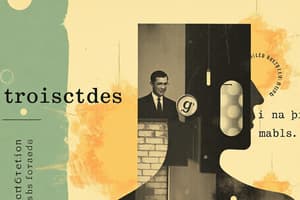Podcast
Questions and Answers
Which type of verb requires a direct object?
Which type of verb requires a direct object?
- Transitive verb (correct)
- Modal verb
- Auxiliary verb
- Intransitive verb
What is the function of a direct object in a sentence with a transitive verb?
What is the function of a direct object in a sentence with a transitive verb?
- Receiving the action of the verb (correct)
- Indicating time
- Modifying the subject
- Describing the action
Which of the following sentences contains a transitive verb in the passive voice?
Which of the following sentences contains a transitive verb in the passive voice?
- The children are playing outside.
- She sang beautifully.
- The cake was baked by Mary. (correct)
- He runs every morning.
Choose the correct example of a transitive verb followed by an infinitive phrase:
Choose the correct example of a transitive verb followed by an infinitive phrase:
In the sentence, 'The gift was wrapped by Sarah,' who performed the action of wrapping the gift?
In the sentence, 'The gift was wrapped by Sarah,' who performed the action of wrapping the gift?
Which of the following is NOT a common transitive verb?
Which of the following is NOT a common transitive verb?
What role do transitive verbs play in a sentence?
What role do transitive verbs play in a sentence?
Flashcards are hidden until you start studying
Study Notes
Transitive Verbs
Transitive verbs are action verbs that require a direct object, which is a noun or pronoun that receives the action of the verb. They pass the action from a doer to a receiver. This type of verb is commonly used to express an action that affects an object, such as "write," "speak," or "give."
Example:
- John wrote a letter.
- She spoke loudly.
- They gave the money to charity.
Transitive verbs can also be followed by an infinitive phrase, which starts with a to-infinitive. For instance, in the sentence "John wants to write a letter," "write" is a transitive verb that takes the direct object "a letter."
Transitive verbs can also be used in the passive voice, where the receiver of the action becomes the subject of the sentence. In the passive voice, the agent performing the action is often mentioned in a prepositional phrase.
Example:
- A letter was written by John.
- The money was given to charity.
Some common transitive verbs include:
- Buy
- Sell
- Eat
- Drink
- Write
- Speak
- Help
- Teach
- Listen
- Watch
Transitive verbs are essential in expressing actions and relationships between objects and their doers. They help convey the intended meaning and provide a clear understanding of the action taking place.
Studying That Suits You
Use AI to generate personalized quizzes and flashcards to suit your learning preferences.




